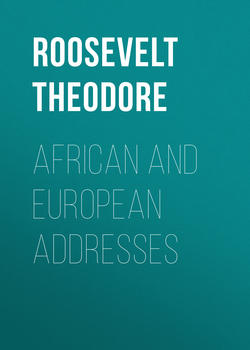African and European Addresses

Реклама. ООО «ЛитРес», ИНН: 7719571260.
Отрывок из книги
In the tumult, on the one hand of admiration and praise and on the other of denunciation and criticism, which Mr. Roosevelt's tour in Africa and Europe excited throughout the civilized world, there was one—and I am inclined to think only one—note of common agreement. Friends and foes united in recognizing the surprising versatility of talents and of ability which the activities of his tour displayed. Hunters and explorers, archæologists and ethnologists, soldiers and sailors, scientists and university doctors, statesmen and politicians, monarchs and diplomats, essayists and historians, athletes and horsemen, orators and occasional speakers, met him on equal terms. The purpose of the present volume is to give to American readers, by collecting a group of his transatlantic addresses and by relating some incidents and effects of their delivery, some impression of one particular phase of Mr. Roosevelt's foreign journey,—an impression of the influence on public thought which he exerted as an orator.
No one would assert that Mr. Roosevelt possesses that persuasive grace of oratory which made Mr. Gladstone one of the greatest public speakers of modern times. For oratory as a fine art, he has no use whatever; he is neither a stylist nor an elocutionist; what he has to say he says with conviction and in the most direct and effective phraseology that he can find through which to bring his hearers to his way of thinking. Three passages from the Guildhall speech afford typical illustrations of the incisiveness of his English and of its effect on his audience.
.....
"The World Movement," the address at the University of Berlin, was the first of two distinctively academic, or scholastic utterances, the other, of course, being the Romanes lecture. The Sorbonne speech was almost purely sociological and ethical. There are, to be sure, social and moral applications made of the theories laid down at Berlin and at Oxford; but these two university addresses are distinctly for a university audience. My own judgment is that the Sorbonne and Guildhall addresses were more effective in their human interest and their immediate political influence. But at both Berlin and Oxford, Mr. Roosevelt showed that he could deal with scholarly subjects in a scholarly fashion. It may be that he desired on these two occasions to give some indication that, although universally regarded as a man of action, he is entitled also to be considered as a man of thought. The lecture at the University of Berlin was a brilliant and picturesque academic celebration in which doctors' gowns, military uniforms, and the somewhat bizarre dress of the representatives of the undergraduate student corps, mingled in kaleidoscopic effect. One interesting feature of the ceremony was the singing by a finely trained student chorus without instrumental accompaniment, of Hail Columbia and The Star-Spangled Banner, harmonized as only the Germans can harmonize choral music. The Emperor and the Empress, with several members of the Imperial family, attended the lecture. Those who sat near the Emperor could see that he followed the address with genuine interest, nodding his head, or smiling now and then with approval at some incisively expressed idea, or some phrase of interjected humor, or a characteristic gesture on the part of the speaker. In one respect the lecture was a tour de force. On account of a sharp attack of bronchitis, from which he was then recovering, it was not decided by the physicians in charge until the morning of the lecture that Mr. Roosevelt could use his voice for one hour in safety. Arrangements had been made to have some one else read the lecture if at the last moment it should be necessary; and the fact that Mr. Roosevelt was able to do it himself effectively under these circumstances indicates that he has some of the physical as well as the intellectual attributes of the practised orator.
Next in chronological order comes the Guildhall speech. In the picturesqueness of its setting, in the occasion which gave rise to it, in the extraordinary effect it had upon public opinion in Great Britain, the continent of Europe, and America, and in the courage which it evinced on the part of the speaker, it is in my judgment the most striking of all Mr. Roosevelt's foreign addresses.
.....